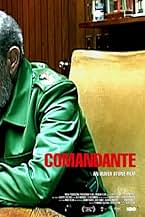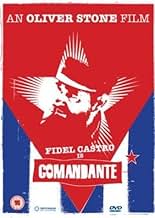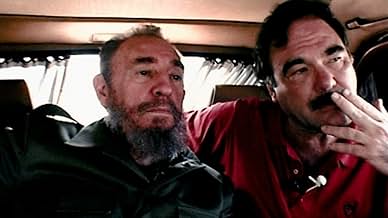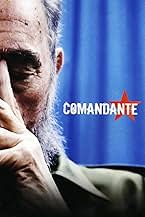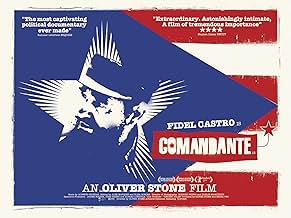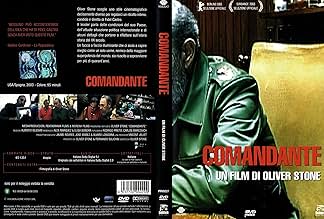VALUTAZIONE IMDb
6,9/10
3947
LA TUA VALUTAZIONE
Aggiungi una trama nella tua linguaDocumentary on the director's meeting with Castro.Documentary on the director's meeting with Castro.Documentary on the director's meeting with Castro.
- Regia
- Sceneggiatura
- Star
Ernesto 'Che' Guevara
- Self
- (filmato d'archivio)
John F. Kennedy
- Self
- (filmato d'archivio)
Richard Nixon
- Self
- (filmato d'archivio)
Janet Reno
- Self
- (filmato d'archivio)
Jaume Roures
- Self
- (non citato nei titoli originali)
Santiago Segura
- Self
- (non citato nei titoli originali)
Recensioni in evidenza
This film is an interesting document only because it provides a glimpse into the leader's more trivial pursuits. ("I've seen TITANIC on video. It needs a big screen" says Castro.) It fails miserably where Oliver Stones asks tough questions yet fails to pursue the partial answers, or at times total avoidance of the question altogether.
Some of the issues talked around are surprising (The CIA role in Angola, Cuba's AIDS quarantine camps, the role of Miami exiles, 1980's prison camps for gays) while others are just bizarre (the lack of multiple parties in Cuban elections, his son's US education, Nicaragua and Venezuela).
The documentary instead puts us through yet another series of Che Guevara tales told less than honestly by Fidel. The frequent shots of Eva Peron suggest that Fidel Castro's revolution is not a failed relic but rather the dreamy illusions of yet another misguided albeit glamorous femme fatale.
Some of the issues talked around are surprising (The CIA role in Angola, Cuba's AIDS quarantine camps, the role of Miami exiles, 1980's prison camps for gays) while others are just bizarre (the lack of multiple parties in Cuban elections, his son's US education, Nicaragua and Venezuela).
The documentary instead puts us through yet another series of Che Guevara tales told less than honestly by Fidel. The frequent shots of Eva Peron suggest that Fidel Castro's revolution is not a failed relic but rather the dreamy illusions of yet another misguided albeit glamorous femme fatale.
This film is a fantastic, hypnotic encounter with the legendary Marxist, world agitator and bete noire to America, Fidel Castro. It features left-wing warrior Oliver Stone's trademark flash cutting and controversial storytelling, alongside a simply stunning musical score from Alberto Iglesias. Prepare for the Buena Vista Social Club (2001) on revolutionary acid.
The beginning of Commandante yet another Oliver Stone masterpiece is similar to the beginning of his epic JFK (1991): lots of archive footage of Castro and Cuba, only this time intercut with masses of frenzied crowds drunk on revolutionary fervour, all shouting 'Fidel, Fidel', hailing their great man who is still there in this film, forty years later. Incredible.
There is both 1960s and modern footage of Havana featuring giant murals of 'Che' Guevara, Fidel ('VIVA FIDEL CASTRO') and a total absence of any corporate, Western advertising whatsoever. There is a lot of poverty, but also a series of impromptu meetings between Castro (and Stone) and various Cubans in the streets. Propaganda or planned? The movie harks back to the original revolution in 1959 and Castro's initial pro-Western peoples revolution, hailing (in English) 'representative democracy' and 'social justice'. Of course, the American corporations and political elite could never countenance any notion of true democracy just ninety miles from their corrupt lands and so the story unfolds of how various presidents tried to invade the island and destroy their path.
Fidel himself at 80 is surprisingly fit and optimistic, always in his olive green military fatigues. He appears to be a genuine messiah, despite the paradox of religion and atheistic communism in this island paradise. He wears his customary beard, is polite and genuinely sincere. Castro and Oliver Stone in a remarkably frank and candid series of interviews go on to discuss everything from politics, film, women and nationalism. Castro admires Sophia Loren, Charlie Chaplin, Khruschev, Gorbachev, Depardieu and a host of others. He has watched Titanic and Gladiator but hates Nixon who he considers the originator of the American hatred of his island yet feels sorry for Kennedy for being assassinated.
Could George W Bush even consider for one second walking the streets of his capital city? No, he would be strung up as a corrupt war criminal and stooge to all of the corporate giants that have been banished from Cuba (Texaco, Gulfoil, McDonalds, etc.).
In the original 1960s footage Castro is hailed by crowds of literally one million people. He is a strange combo of Dr Caligari, Karl Marx and the Pope.
The beginning of Commandante yet another Oliver Stone masterpiece is similar to the beginning of his epic JFK (1991): lots of archive footage of Castro and Cuba, only this time intercut with masses of frenzied crowds drunk on revolutionary fervour, all shouting 'Fidel, Fidel', hailing their great man who is still there in this film, forty years later. Incredible.
There is both 1960s and modern footage of Havana featuring giant murals of 'Che' Guevara, Fidel ('VIVA FIDEL CASTRO') and a total absence of any corporate, Western advertising whatsoever. There is a lot of poverty, but also a series of impromptu meetings between Castro (and Stone) and various Cubans in the streets. Propaganda or planned? The movie harks back to the original revolution in 1959 and Castro's initial pro-Western peoples revolution, hailing (in English) 'representative democracy' and 'social justice'. Of course, the American corporations and political elite could never countenance any notion of true democracy just ninety miles from their corrupt lands and so the story unfolds of how various presidents tried to invade the island and destroy their path.
Fidel himself at 80 is surprisingly fit and optimistic, always in his olive green military fatigues. He appears to be a genuine messiah, despite the paradox of religion and atheistic communism in this island paradise. He wears his customary beard, is polite and genuinely sincere. Castro and Oliver Stone in a remarkably frank and candid series of interviews go on to discuss everything from politics, film, women and nationalism. Castro admires Sophia Loren, Charlie Chaplin, Khruschev, Gorbachev, Depardieu and a host of others. He has watched Titanic and Gladiator but hates Nixon who he considers the originator of the American hatred of his island yet feels sorry for Kennedy for being assassinated.
Could George W Bush even consider for one second walking the streets of his capital city? No, he would be strung up as a corrupt war criminal and stooge to all of the corporate giants that have been banished from Cuba (Texaco, Gulfoil, McDonalds, etc.).
In the original 1960s footage Castro is hailed by crowds of literally one million people. He is a strange combo of Dr Caligari, Karl Marx and the Pope.
I just saw Comandante on Greek public television, in its entirety and uninterrupted and was immediately drawn to it.
Whether one agrees with Cuba's political system or not, is not the issue here. What Oliver Stone has achieved is what no journalist or historian has ever come close to. He brings himself and his crew right up close to the aged leader and confronts him relentlessly with questions from the mundane to the esoteric and from the political to the personal. Ideas about the past and the future, about dreams, art, democracy, colonialism, family, religion, women's rights, education, love etc are all exposed here, bringing out an intimate portrait. The questions are often uncomfortable as when Stone asks Castro about his ex wives in front of his wife, or when his claims about policing in Cuba are denied by one of Stone's crew members. Yet Castro even at this age, is sharp, humorous and poetic in a way that reveals the intellectual behind the politician.
It is also a travel documentary of Havana where Fidel Castro is Stone's guide and walks him through the city's monuments and cafés, sits next to him at the back seat of his car, eats and drinks with him and we get a sense that he knows what is happening in Havana's every alley.
One thing is for sure: no other country leader would ever allow himself the closeness Castro offers to Stone and expose his feelings and doubts with such spontaneity.
Stone turns a formal encounter into a family visit and brings the audience to meet an iconic political figure and spend a couple of intimate hours with him.
A work that leaves you thinking for a long while.
Whether one agrees with Cuba's political system or not, is not the issue here. What Oliver Stone has achieved is what no journalist or historian has ever come close to. He brings himself and his crew right up close to the aged leader and confronts him relentlessly with questions from the mundane to the esoteric and from the political to the personal. Ideas about the past and the future, about dreams, art, democracy, colonialism, family, religion, women's rights, education, love etc are all exposed here, bringing out an intimate portrait. The questions are often uncomfortable as when Stone asks Castro about his ex wives in front of his wife, or when his claims about policing in Cuba are denied by one of Stone's crew members. Yet Castro even at this age, is sharp, humorous and poetic in a way that reveals the intellectual behind the politician.
It is also a travel documentary of Havana where Fidel Castro is Stone's guide and walks him through the city's monuments and cafés, sits next to him at the back seat of his car, eats and drinks with him and we get a sense that he knows what is happening in Havana's every alley.
One thing is for sure: no other country leader would ever allow himself the closeness Castro offers to Stone and expose his feelings and doubts with such spontaneity.
Stone turns a formal encounter into a family visit and brings the audience to meet an iconic political figure and spend a couple of intimate hours with him.
A work that leaves you thinking for a long while.
In the American corporate media, Castro is always played up as some kind of monster. The corporate media (and a host of draconian laws help) prevent us from hearing what he has to say. This documentary is excellent if anything but to give us a chance to hear what Castro has to say.
This was geared for an American audience, most of whom are probably ignorant about who Arbenz was, or Allende, and who probably never heard of the MPLA. It's mentioned at some point in the film that all the bad things that American big business and the CIA do around the world is known around the world - known everywhere except by US citizens. This is true, then again, the US is one of the few industrialized countries who for most of the 20th into the 21st century had almost all of it's radio and television channels, as well as newspaper printing presses controlled by corporations. It's unfortunate that Stone thus feels he has to ask about Cubans in Vietnam and this sort of nonsense which takes up time that could have been used asking more about Castro's perspective of what is going on in Latin America.
This was geared for an American audience, most of whom are probably ignorant about who Arbenz was, or Allende, and who probably never heard of the MPLA. It's mentioned at some point in the film that all the bad things that American big business and the CIA do around the world is known around the world - known everywhere except by US citizens. This is true, then again, the US is one of the few industrialized countries who for most of the 20th into the 21st century had almost all of it's radio and television channels, as well as newspaper printing presses controlled by corporations. It's unfortunate that Stone thus feels he has to ask about Cubans in Vietnam and this sort of nonsense which takes up time that could have been used asking more about Castro's perspective of what is going on in Latin America.
In communism/socialism the beginning is always the End. One dictator removes another from power by force. Many praise the men that at the moment believe what they fight for some kind of change, usually when the previous government has been corrupt in some way. Corruption creates poverty and poverty leads to stress then becomes the fuel for a revolution. Most revolutions in our history have lead to totalitarianism. I like to blame that on human nature the USA is not perfect but its pretty close if you do not know what it's like to live in Cuba don't be mistaken tourist don't see the suffering especially if you have the money. Venezuela is a fresh look on early Cuba lets see how its ends up in a few years. HUGO CHAVEZ and some fanatics are beginning to dismantle any checks and balances the country may have plans on changing how long he can serve as president no limit remind you of something. Enough about that after so many years and tears and lives lost at sea. The exiled Cubans have preserved peace by leaving through 90 miles of rough seas on anything that floats not recreating another revolt adding to the cycle of bull in almost 40 odd years. Thousands of lives lost at sea as well as injustices on that prisoner island. Please think why would so many people risk their lives in such a way.
Lo sapevi?
- QuizAt the beginning of the movie, when Stone and Castro are strolling through the corridors, you see Santiago Segura, dressed in white, standing in front of a group of people.
- ConnessioniFeatures Vatel (2000)
- Colonne sonore11.11
Written and Performed by Paul Kelly
I più visti
Accedi per valutare e creare un elenco di titoli salvati per ottenere consigli personalizzati
- How long is Comandante?Powered by Alexa
Dettagli
- Data di uscita
- Paesi di origine
- Sito ufficiale
- Lingue
- Celebre anche come
- Son efsane - Comandante
- Aziende produttrici
- Vedi altri crediti dell’azienda su IMDbPro
Botteghino
- Lordo in tutto il mondo
- 135.633 USD
- Tempo di esecuzione1 ora 39 minuti
- Colore
- Mix di suoni
Contribuisci a questa pagina
Suggerisci una modifica o aggiungi i contenuti mancanti

Divario superiore
By what name was Comandante (2003) officially released in India in English?
Rispondi

